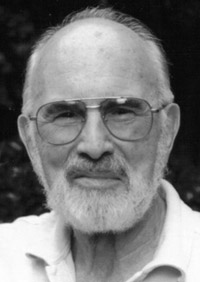In Memoriam: Lionel Lewis, CHP
1926-2009
by Mary L. Birch, CHP, and Robert E. Sorber, CHP

Lionel Lewis, a charter member and fellow of the Health Physics Society, passed away on 4 September 2009. He was a well-respected operational health physicist. Lionel’s career in health physics began when he received an Atomic Energy Commission fellowship in radiological physics with the University of Rochester and Brookhaven National Laboratory. He received his MS in biophysics from the University of Rochester in 1955; his thesis research, “Neutron and Gamma-Ray Dosimetry of a Thermal Neutron Irradiation Facility,” was included in the proceedings of the first Geneva Conference on the Peaceful Uses of Atomic Energy, 1955. Lionel was certified by the American Board of Health Physics in health physics and reactor health physics.
Lionel had a long career as a health physicist in the nuclear industry, including Brookhaven National Laboratory, the Martin Company Fuel Element Laboratory and Fabrication Facility, and Combustion Engineering’s S1C Prototype Submarine Power Reactor, where he contributed to the U.S. Navy Radiological Safety Manual. Lionel participated in the design, construction, and operation of the experimental Carolinas-Virginia Tube Reactor, the first nuclear power facility in the Southeast, which was built to test the concept of a heavy water moderated and cooled reactor for civilian power. For 21 years, Lionel headed the health physics program at Duke Power Company (now Duke Energy), where he oversaw the development of the radiation protection programs for multiple nuclear power facilities. He retired from Duke Power Company in 1988.
It was his interest in radiation protection in power reactors that established Lionel’s career. In 1961 he developed and implemented the radiation protection program for the experimental Carolinas-Virginia Tube Reactor at a time when utilities understood coal, oil, and gas and no one really understood what operating a power reactor was about. In addition to serving as the facility health physicist, he also served as plant superintendent. When the test reactor was decommissioned, Lionel became the system health physicist for Duke Power Company, a position he held for more than 20 years. In that role, he developed the radiation protection program used for the design, construction, and operation of Duke’s seven nuclear power reactors and adapted the program to a changing regulatory environment.
Lionel influenced the development of radiation protection programs for the entire nuclear industry: Duke Power’s health physics program has served as a model for the development of nuclear programs at other newer nuclear power facilities and for the development of the Department of Energy’s RadCon Manual. His participation in numerous committees and technical organizations included:
- Scientific Committee 46 of the National Council on Radiation Protection & Measurements on operational radiation safety.
- American Nuclear Society standards committees that developed ANS-6.7, Radiation Zoning for Design of Nuclear Power Plants, and ANS-3.7, Radiological Emergency Planning.
- Nuclear Energy Institute and its predecessor organization, the Atomic Industrial Forum Nuclear Utilities Management and Resources Council, where he served on the Low-Level Radioactive Waste Disposal Task Force, the Occupational Radiation Exposure Task Force, and the Operations, Maintenance, and Support Services Advisory Committee.
- American Industrial Hygiene Association Radiation Committee.
- Edison Electric Institute Health Physics Task Force, serving three terms as chair.
- International Atomic Energy Agency committee that wrote Safety Guide SG-05, Radiological Protection During Operation of Nuclear Power Plants.
- North Carolina Radiation Protection Commission.
Lionel is also the author of numerous invited papers and journal articles that described his views and experience in the development of nuclear power facility personnel training, instrumentation, dosimetry, environmental monitoring, outage management, decommissioning, and waste disposal. Lionel developed and implemented, in conjunction with Rensselaer Polytechnic Institute, an on-the-job training program for Duke Power Company health physics personnel that better prepared them to work in power reactor facilities and offered them the opportunity to complete their MS in health physics.
Lionel further influenced the industry by providing technical input to legislation by presenting testimony to the U.S. Senate Committee on the Federal Radiation Protection Management Act of 1982 and to the Nuclear Regulatory Commission’s Advisory Committee on Reactor Safeguards on two occasions on proposed revision to 10 CFR Part 20.
In addition to the Health Physics Society, where he was at one time on the Public Information, Standards, and Program Committees as well as involved with the North Carolina Chapter, Lionel was a member of the American Nuclear Society and the American Industrial Hygiene Association. As a certified health physicist, he also served on the Panel of Examiners. Lionel assisted the Oak Ridge Radiation Emergency Assistance Center (REAC/TS) personnel under the auspices of the Pan American Health Organization in presenting a regional seminar in Brazil in 1981 and in Mexico in 1987 on radiation protection and emergency response.
Fellow reactor health physicists will remember Lionel’s wit, his candor, and his willingness to share his health physics knowledge with them. We feel privileged to have had the opportunity to work for him and with him and to consider him our friend.
Lionel leaves behind two sons, Dr. Daniel Lewis and Gregory Lewis (wife Debbie Lewis), and a daughter, Leslie Lewis Walder, as well as a grandson, Sean Walder. He is also survived by his brother, Robert “Bob” Lewis, and sister-in-law, Arlene Lewis; nephews, Richard Lewis and Mitchell Lewis, and niece, Randi Achevedo, and their families; and his cousin, Rhoda Leshansky.
At the request of the family, any donations made in his memory should be directed to either the American Cancer Society, PO Box 22718, Oklahoma City, OK 73123-1718 (may donate online at www.cancer.org) or Running Strong for American Indian Youth, 2550 Huntington Ave., Suite 200, Alexandria, VA 22303 (may donate online at www.indianyouth.org).




